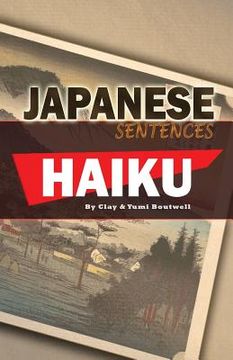Compartir
Japanese Sentences: Haiku (en Inglés)
Yumi Boutwell
(Autor)
·
Clay Boutwell
(Autor)
·
Createspace Independent Publishing Platform
· Tapa Blanda
Japanese Sentences: Haiku (en Inglés) - Boutwell, Yumi ; Boutwell, Clay
$ 434.17
$ 723.62
Ahorras: $ 289.45
Elige la lista en la que quieres agregar tu producto o crea una nueva lista
✓ Producto agregado correctamente a la lista de deseos.
Ir a Mis Listas
Origen: Estados Unidos
(Costos de importación incluídos en el precio)
Se enviará desde nuestra bodega entre el
Martes 16 de Julio y el
Miércoles 24 de Julio.
Lo recibirás en cualquier lugar de México entre 1 y 3 días hábiles luego del envío.
Reseña del libro "Japanese Sentences: Haiku (en Inglés)"
Learn Japanese vocabulary through Haiku! Learn twenty famous haiku in Japanese. Every word and line is broken down and thoroughly explained. Every kanji has furigana and romaji (romanized Japanese) is also provided so beginners and advanced students alike can enjoy. There is also a full Japanese-English glossary in the back of the book. Included are MP3s of the poems absolutely FREE. The sound files were recorded by a native Japanese voice actress. The haiku presented in this ebook were selected from the following poets: Kobayashi Issa (1763-1828) is considered to be one of the four great masters of haiku in addition to Basho, Buson, and Shiki and rivals Basho in popularity. He wrote over 20,000 haiku. "issa" means "one (cup of) tea." This haiku is one of his most famous in Japan. Yosa Buson (1716-1783) is one of the four great masters of haiku. The others are Basho, Issa, and Shiki. This poem was published in 1762 and is one of his most famous. Takahama Kyoshi (1874-1959) a Japanese poet from Kanagawa Japan. He continued with the traditional style of haiku using kigo (seasonal words or phrases). He wrote some 40,000 to 50,000 haiku in his lifetime. Ozaki Housai (1885-1926), as this haiku suggests, was highly influenced and was an influencing factor in the modern free verse style of haiku. An alcoholic throughout most of his life, his poems tend to emphasize loneliness as this one in particular does. Masaoka Shiki (1867-1902) was the pen-name of Masaoka Noboru. He is considered to be one of the four great masters of haiku in addition to Basho, Buson, and Issa. Shiki managed to revive and strengthen interest in haiku for modern Japan. And the most famous Japanese poet of all time...Matsuo Basho (1644-1694) is undoubtedly the most famous of the classical haiku poets. His mastery of haiku and his wanderings around Japan are attested by the many monuments with his poems. His most famous collection of poems and writings is called, "Oku no Hosomichi." It was written while on a long journey in Edo Japan in the spring of 1689. Today many people trace his footsteps for themselves.
- 0% (0)
- 0% (0)
- 0% (0)
- 0% (0)
- 0% (0)
Todos los libros de nuestro catálogo son Originales.
El libro está escrito en Inglés.
La encuadernación de esta edición es Tapa Blanda.
✓ Producto agregado correctamente al carro, Ir a Pagar.

